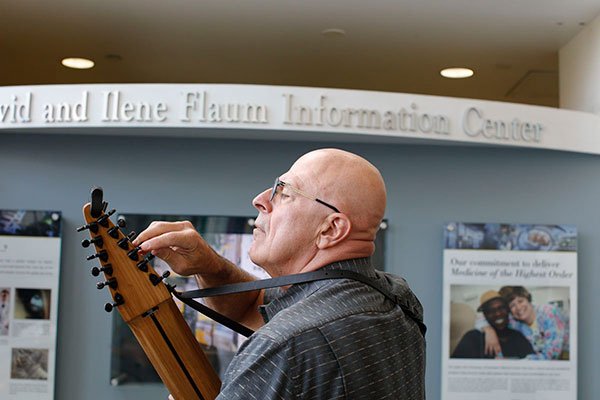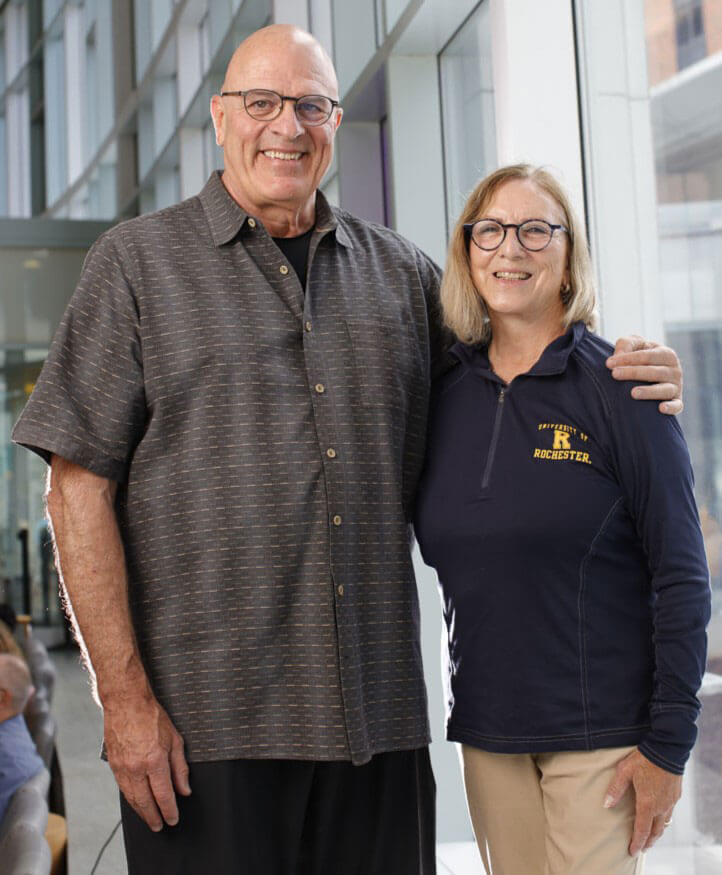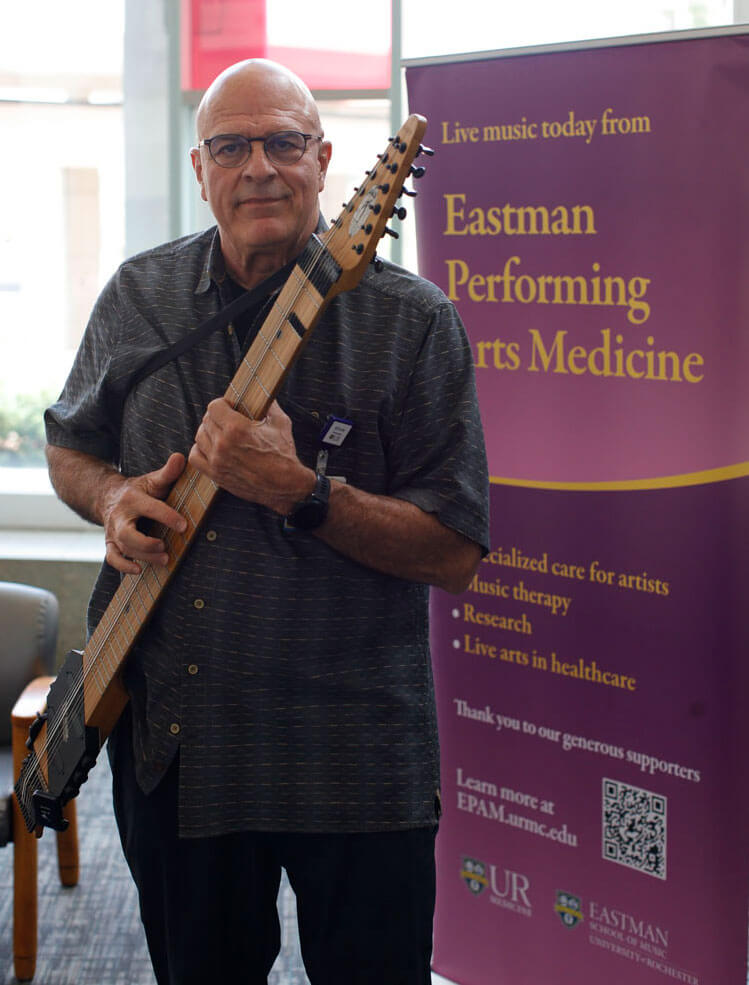Powered by passion
Powered by passion
Bob and Mabelle Pizzutiello have found joy and purpose in supporting collaborative programs at the University of Rochester.

As a musician for the Eastman Performing Arts Medicine Center (EPAM), Bob Pizzutiello ’77, ’78 (MS) plays the Chapman Stick in the lobby of Strong Memorial Hospital.
“Most human beings are not monolithic,” says Bob Pizzutiello ’77, ’78 (MS), “They enjoy different perspectives.” He and his wife Mabelle Pizzutiello ’63N, P’89 support many programs at the University of Rochester, with their interests spanning the arts, sciences, and healthcare, as well as those focused on equity, diversity, and inclusion, but the Eastman Performing Arts Medicine Center (EPAM) is one of the most unique.
Finding intersections between music and science comes naturally for Bob who pursued a degree in electrical engineering but also made time to study the physics of music. His education at the University of Rochester allowed him to explore the interconnection between his broad interests. When he first came to Rochester in 1973, a teenage Bob had the impression that he would be done learning at the end of college. Instead, those years launched a lifelong career of discovery.
Bob recognizes the valuable life skills that he gained at Rochester—how to think and solve problems. As a Joseph C. Wilson Scholar, Bob had the opportunity to take any course across the University, and he made the most of it. In addition to his undergraduate workload, he took classes in the School of Medicine and Dentistry, which were foundational for him and his future work.
He credits his full scholarship for not only making it possible to pursue his education, but to find a career. At the age of 23, he completed a master’s degree, and he started his first real job at the University of Rochester Medical Center.
Bob spent his career working in community hospitals as a medical physicist, while also bringing his learnings about physics and technology into the national discussion, as an advisor to the Food and Drug Administration. He founded and led Upstate Medical Physics, a regional practice, and was the senior vice president of Landauer Medical Physics, a national organization, collaborating with medical physicists to deliver services to individual health care facilities and larger integrated delivery networks. He is also a past president of the New York State Radiological Society.
As people come into earshot of the music, I observe an astounding transformation. They look up, hear the gentle melodies, and they smile.`` – Bob Pizzutiello
Bob’s professional contributions have been enhanced by his ongoing practice as a musician. He has been playing in his band, Indigo Breeze, for more than 10 years, and he started the Dreamseeds Jazz Band for underserved youth in Rochester in 2015. Bob sees himself as an “instrument for change in the lives of everyday people” and looks for ways to connect with others through the universal language of music.

Bob Pizzutiello ’77, ’78 (MS) and Mabelle Pizzutiello ’63N, P’89 support interdisciplinary programs as members of the George Eastman Circle.
After decades of working in the healthcare setting, Bob learned about the interdisciplinary EPAM and jumped at the chance to become a volunteer. Now he plays the unusual and expressive Chapman Stick in the lobby of Strong Memorial Hospital and witnesses how passersby appreciate the music amidst the chaos of their day.
“As people come into earshot of the music, I observe an astounding transformation,” Bob says, “They look up, hear the gentle melodies, and they smile. Many give a thumbs up or mouth the words ‘thank you.’ One time a patient in a wheelchair told me he was legally blind and asked me to describe my instrument. Another day, two staff members wearing “Interpreter” badges stayed for an extended chat, eventually saying, ‘We really needed this now.’ I recognized the feeling of coming off a difficult case, having worked in hospitals myself for 40 years.”
Mabelle Pizzutiello also spent decades working in a hospital setting after earning her degree in nursing at the University of Rochester. She values the lifelong friends she met as a student and continues to stay involved through alumni events at the School of Nursing, such as their annual Clare Dennison Lecture, where she finds she is always learning something new.
For Mabelle, a lifelong career in nursing has meant that learning and teaching are always connected. For each new skill gained from her instructors, she was immediately responsible for passing it on to another student, reinforcing her education and the teamwork that is central to the profession.
While a student, Mabelle vividly remembers responding to the Mohawk Airlines plane crash in 1963. Called into action to work alongside the trauma team and save the passengers’ lives, she was moved and later became the trauma program manager at Strong Memorial Hospital.

Bob Pizzutiello ’77, ’78 (MS)
Mabelle continues to transfer her knowledge and support on to the next generation of nurses. “Scholarship support made everything possible for me,” she says. “As soon as I graduated, I started giving back so that another student would have the same opportunities I did.”
An appreciator of the arts herself, Mabelle also serves on the MAG Council, lending her hand as a volunteer in support of programs at the Memorial Art Gallery.
Bob and Mabelle are longtime members of the University of Rochester’s George Eastman Circle. They felt that joining the Eastman Circle was a good way to make a sustaining annual contribution that benefits all the programs across the University that matter to them.
Their membership has provided opportunities to connect with fellow alumni and attend events that continue to spark their curiosity. They see the power of the University to implement change in our community and enjoy meeting likeminded individuals who are looking to make a difference for important issues in Rochester and the greater world.
As Bob reflects on the time he spends playing music for the hospital community, and on his support for EPAM in particular, he says, “When I replay these experiences in my head, I feel a deep sense of joy and purpose. This simple act touches people under stress, if only for a moment, with the universal language of music. Supporting the program as a volunteer and as donor means a great deal to me.”
Bob’s professional contributions have been enhanced by his ongoing practice as a musician. He has been playing in his band, Indigo Breeze, for more than 10 years, and he started the Dreamseeds Jazz Band for underserved youth in Rochester in 2015. Bob sees himself as an “instrument for change in the lives of everyday people” and looks for ways to connect with others through the universal language of music.

Bob Pizzutiello ’77, ’78 (MS) and Mabelle Pizzutiello ’63N, P’89 support interdisciplinary programs as members of the George Eastman Circle.
After decades of working in the healthcare setting, Bob learned about the interdisciplinary EPAM and jumped at the chance to become a volunteer. Now he plays the unusual and expressive Chapman Stick in the lobby of Strong Memorial Hospital and witnesses how passersby appreciate the music amidst the chaos of their day.
“As people come into earshot of the music, I observe an astounding transformation,” Bob says, “They look up, hear the gentle melodies, and they smile. Many give a thumbs up or mouth the words ‘thank you.’ One time a patient in a wheelchair told me he was legally blind and asked me to describe my instrument. Another day, two staff members wearing “Interpreter” badges stayed for an extended chat, eventually saying, ‘We really needed this now.’ I recognized the feeling of coming off a difficult case, having worked in hospitals myself for 40 years.”
Mabelle Pizzutiello also spent decades working in a hospital setting after earning her degree in nursing at the University of Rochester. She values the lifelong friends she met as a student and continues to stay involved through alumni events at the School of Nursing, such as their annual Clare Dennison Lecture, where she finds she is always learning something new.
For Mabelle, a lifelong career in nursing has meant that learning and teaching are always connected. For each new skill gained from her instructors, she was immediately responsible for passing it on to another student, reinforcing her education and the teamwork that is central to the profession.
While a student, Mabelle vividly remembers responding to the Mohawk Airlines plane crash in 1963. Called into action to work alongside the trauma team and save the passengers’ lives, she was moved and later became the trauma program manager at Strong Memorial Hospital.

Bob Pizzutiello ’77, ’78 (MS)
Mabelle continues to transfer her knowledge and support on to the next generation of nurses. “Scholarship support made everything possible for me,” she says. “As soon as I graduated, I started giving back so that another student would have the same opportunities I did.”
An appreciator of the arts herself, Mabelle also serves on the MAG Council, lending her hand as a volunteer in support of programs at the Memorial Art Gallery.
Bob and Mabelle are longtime members of the University of Rochester’s George Eastman Circle. They felt that joining the Eastman Circle was a good way to make a sustaining annual contribution that benefits all the programs across the University that matter to them.
Their membership has provided opportunities to connect with fellow alumni and attend events that continue to spark their curiosity. They see the power of the University to implement change in our community and enjoy meeting likeminded individuals who are looking to make a difference for important issues in Rochester and the greater world.
As Bob reflects on the time he spends playing music for the hospital community, and on his support for EPAM in particular, he says, “When I replay these experiences in my head, I feel a deep sense of joy and purpose. This simple act touches people under stress, if only for a moment, with the universal language of music. Supporting the program as a volunteer and as donor means a great deal to me.”
Join us
To learn more about joining the George Eastman Circle to make a lasting impact with your philanthropy, visit www.GeorgeEastmanCircle.com or call (585) 276-8740.
About Eastman Performing Arts Medicine Center (EPAM)
The mission of Eastman Performing Arts Medicine Center (EPAM) is to deliver the collaborative potential of the performing arts and medicine to the healthcare environment; to support the medical needs of artists through clinical and pedagogical support; and to understand through research the underlying mechanisms by which music improves health and wellbeing.
EPAM seeks to enrich the healthcare environment by integrating music that calms, nurtures and inspires. Utilizing non-traditional settings such as public spaces in hospitals, waiting and family rooms, and hallways, our hospital community experiences personal and meaningful interactions with world-class musicians. Weekly public performances are held throughout the hospital public areas.
The University of Rochester School of Nursing is also involved in research alongside EPAM. Kathi Heffner, PhD, professor of nursing, medicine, and psychiatry, has collaborated with faculty at the Eastman School of Music to examine piano training for older adults with mild cognitive impairment (MCI) as a brain exercise to see if it can promote emotional wellbeing, as well as ultimately slow cognitive decline in MCI.
To learn more about EPAM, visit urmc.rochester.edu/eastman-performance-medicine
— Kristina Beaudett, Fall 2024


